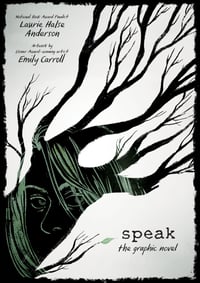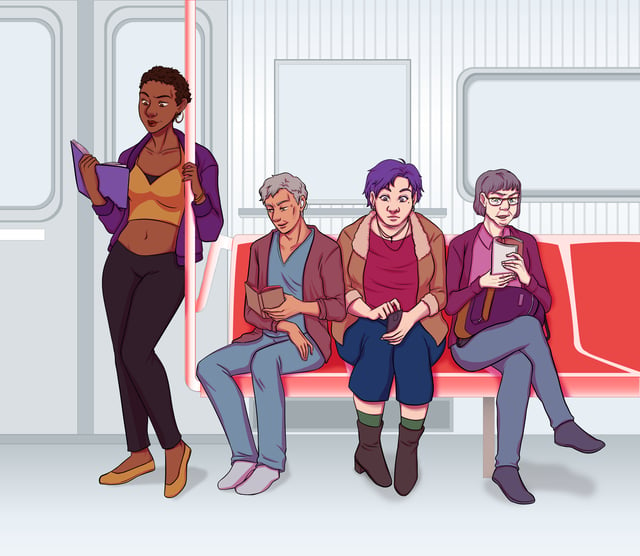 Today we're going to do something a little different. This is not a romance comic, or romantic at all. It's a story of a young girl finding her voice after experiencing sexual violence. The review may be triggering for some people, so I'm going to give a bit of information first and then let you know when to stop reading if that content will make you feel unsafe.
Today we're going to do something a little different. This is not a romance comic, or romantic at all. It's a story of a young girl finding her voice after experiencing sexual violence. The review may be triggering for some people, so I'm going to give a bit of information first and then let you know when to stop reading if that content will make you feel unsafe.
SPEAK was originally published as a novel in 1999, when I was 13. I was the same age as the protagonist in this story, which probably has a lot to do with my reading of it. It's stayed in print since then, stayed on recommended reading lists, stayed horribly relevant. (You can buy the novel here.)
When I heard that SPEAK had been adapted as a graphic novel and updated for a modern audience, I tripped over myself to start reading it. It's a powerful story and speaks to teens and women living through this #metoo movement. I'm writing this after three months of continuous coverage of sexual assault and misconduct. It's been overwhelming and exhausting and, yes, triggering.
This book is healing.
Macmillan is partnering with RAINN to match donations during the month of February, as is Politics & Prose, the bookstore in DC. More information about the bookstore event can be found HERE.
More information about the partnership between Macmillan and RAINN, including details of the incentive program and instructions for donating can be found HERE.
RAINN (Rape, Abuse & Incest National Network) is the nation's largest anti-sexual violence organization. RAINN created and operates the National Sexual Assault Hotline (800.656.HOPE, online.rainn.org y rainn.org/es) in partnership with more than 1,000 local sexual assault service providers across the country and operates the DoD Safe Helpline for the Department of Defense. RAINN also carries out programs to prevent sexual violence, help survivors, and ensure that perpetrators are brought to justice.
We encourage you to donate if you are able and to share the campaign.
Our review will commence below. If you need to stop reading in order to feel safe, please do so now.
************
SPEAK gets its name from the protagonist, Melinda, and her decision to stop speaking after a violent sexual assault. As a reader, you go into the book knowing that she's been assaulted, but not much else. Melinda isn't an unreliable narrator - she never lies to you - but she's unable to address her trauma directly or to discuss it with others, so the reader is left to follow her journey to recovery.
The art is stunning, using black white and shades of gray to illustrate the bleak landscape of Melinda's emotional state. She is ostracized at school. People talk about her but no one will talk to her unless it's to mock or insult her. She's physically pushed and tripped. She skips school, fights with her parents, and doesn't do her homework. As a reader, you see all of this on the page, with scenes that include jagged tree branches reaching for her when she tries to sleep or ghost hands at her throat when she tries to speak. You can see some preview pages here.
The narrative follows Melinda through one entire school year, which gives us useful markers for the passage of time and the continual slide of Melinda's grades. The focus on time is also important as a reminder to anyone who says "why didn't she tell anyone?" It takes Melinda, and most women, a long time to come to terms with what happened to them. And no, Melinda isn't magically better by the end of this book. She is, however, on a path that will lead her to healing.
It's difficult to be objective when reviewing this story, both because I read the original when I was 13, but also because it's so emotionally evocative. Melinda struggles with self-harm, with people-pleasing, and with an overwhelming desire to disappear into herself. She holds onto her words as a form of keeping herself together, as if any form of expression will break her open for good. It's so honest and painful and... true.
When I turned the last page of the book, I was crying. I hadn't cried through the entire book, but that last page, when Melinda starts to come up for air and expresses herself? I cried tears of relief.
When I say that this book is healing, I don't mean that you'll feel great while reading it, or that it will prevent sexual assault. I mean that it ends with hope - a hope that we can all use right now.
If you'd like to buy a copy, here are some links: Amazon, iBooks, Kobo, Macmillan

